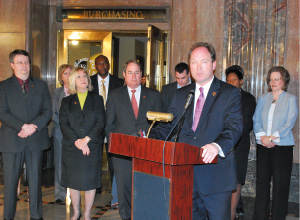
Microlending impacts more than businesses. It impacts people.
Securing a micro-loan helped Richard Garza of Garza’s Goodies get off of disability and it helped the Glass of Milk Cake Company hire two employees.
However, securing a micro-loan wouldn’t have been possible without the help of the city’s new micro-loan program.
“One of the biggest challenges we heard from small businesses was it was difficult to get a loan in these difficult economic times,” said Scott Taylor, chair of the City of Kansas City’s Special Committee on Small Business. “This (microlending program) is a historic partnership between the small business community and advocates for small businesses.”
Through its River Market Loan Fund, Kansas City contributed $25,000 to the Loan Loss Reserve Fund for Justine PETERSEN, the nation’s second largest Small Business Administration (SBA) lender. Justine PETERSEN has also partnered with the U.S. Small Business Administration Region 7 and the Women’s Business Center.
“It’s been over three years since we’ve had a microlending program in the metro area,” said Sherry Turner, president of the Women’s Employment Network and executive director of the Women’s Business Center.
Thanks to a variety of community partnerships, the city’s micro-loan program has secured $250,000 to loan to small businesses. The average loan is $10,000, but a small business can receive up to $50,000.
To date, 15 micro-loans have been awarded in Kansas City, totaling $90,000.
“This is not only an access to capital issue, it’s a jobs issue,” Turner said.
Josiah Phillips and his wife, Amanda, know that first-hand.
Together, they founded Glass of Milk Cake Company in Kansas City north last May.
Approaching traditional financial institutions for loans proved fruitless. Several banks turned them down. But, Justine PETERSEN became an advocate, Phillips said.
Justine PETERSEN loaned the Phillips’ $15,000, which allowed the couple to hire one part-time and one full-time employee.
“I cannot say enough wonderful things about what Justine PETERSEN was able to do not just for myself and my family -” Phillips stopped mid-sentence and his eyes watered. “But for the employees that we got to hire.”
One of the employees was a young mother, whose husband and herself had been unemployed for a year.
“Now, she has a job, and with a job she has a chance to provide for her five-month-old baby and a way to get them back on their feet,” Phillips said.
“We get to not just survive as a business but help the community,” Amanda said. “It’s a big deal to us.”
Debra Morris, owner of Glory Construction Co. LLC, also secured a loan through Justine PETERSEN.
“I had been to my bank for years, but I couldn’t get any response or help from them. I couldn’t get a loan,” she said.
As a result, she resorted to using Speedy Cash to fund the purchase of materials for her construction work. Now, with a $2,000 loan and $300 to open a secure credit card, life is “a lot easier,” she said.
The city’s microlending program is also a tool that can help the small businesses in Historic Northeast.
“I think it’s a wonderful opportunity for the businesses in the Northeast,” Northeast Kansas City Chamber of Commerce President Bobbi Baker Hughes said.
Often, small businesses don’t need a large loan or don’t qualify for a loan through traditional financial institutions, she said.
“In this situation, they can get smaller loans that are affordable,” she said. “They can do affordable marketing, advertising, merchandising and put some of their business plans in motion a step at a time.
“We just sometimes need to take baby steps and a micro-loan is a perfect tool to help us do that.”
To find out more about the city’s micro-loan program and if you qualify, contact KC BizCare: 1118 Oak St., Kansas City, Mo. • Phone: (816) 513-2492 • Email: kcbizcare@kcmo.org.















